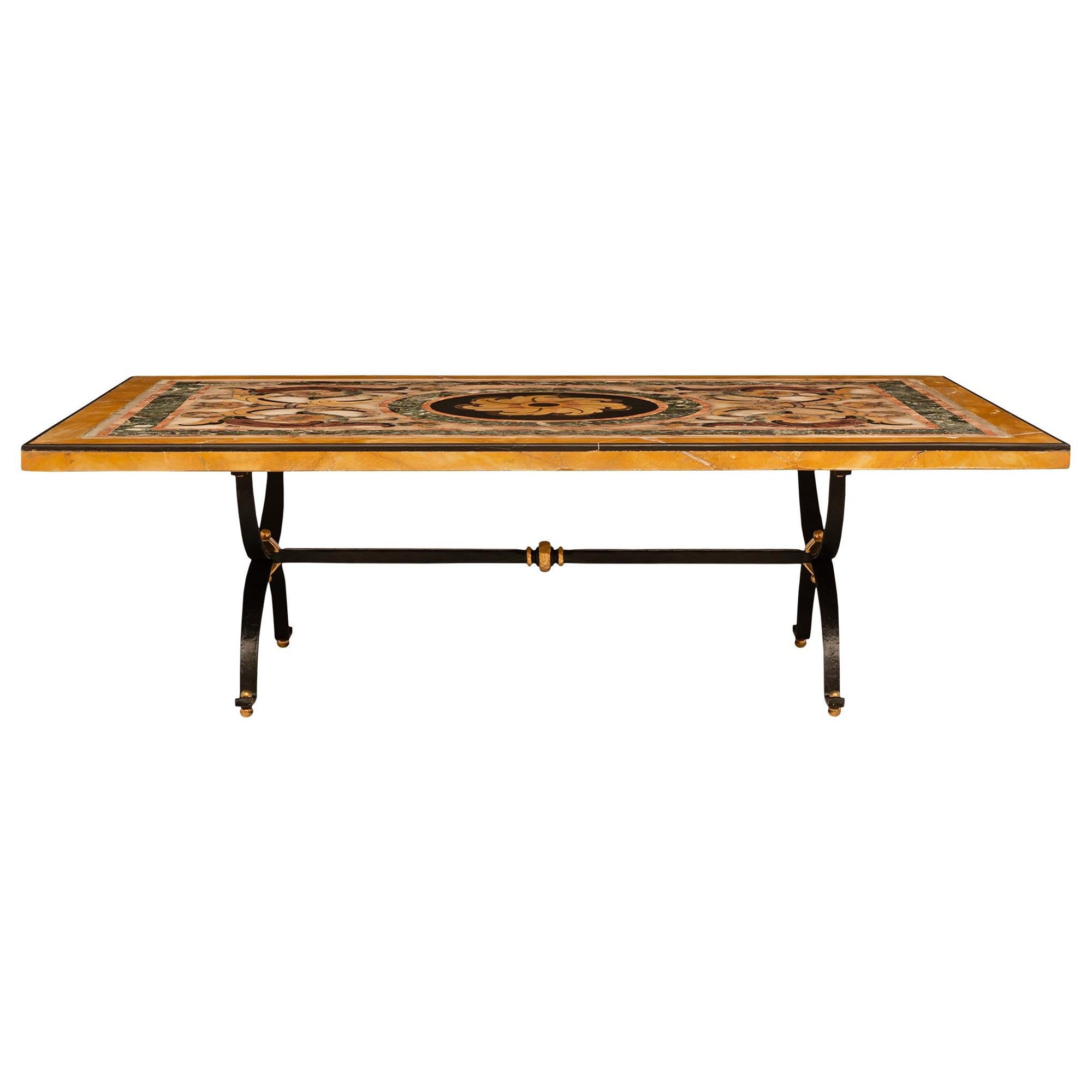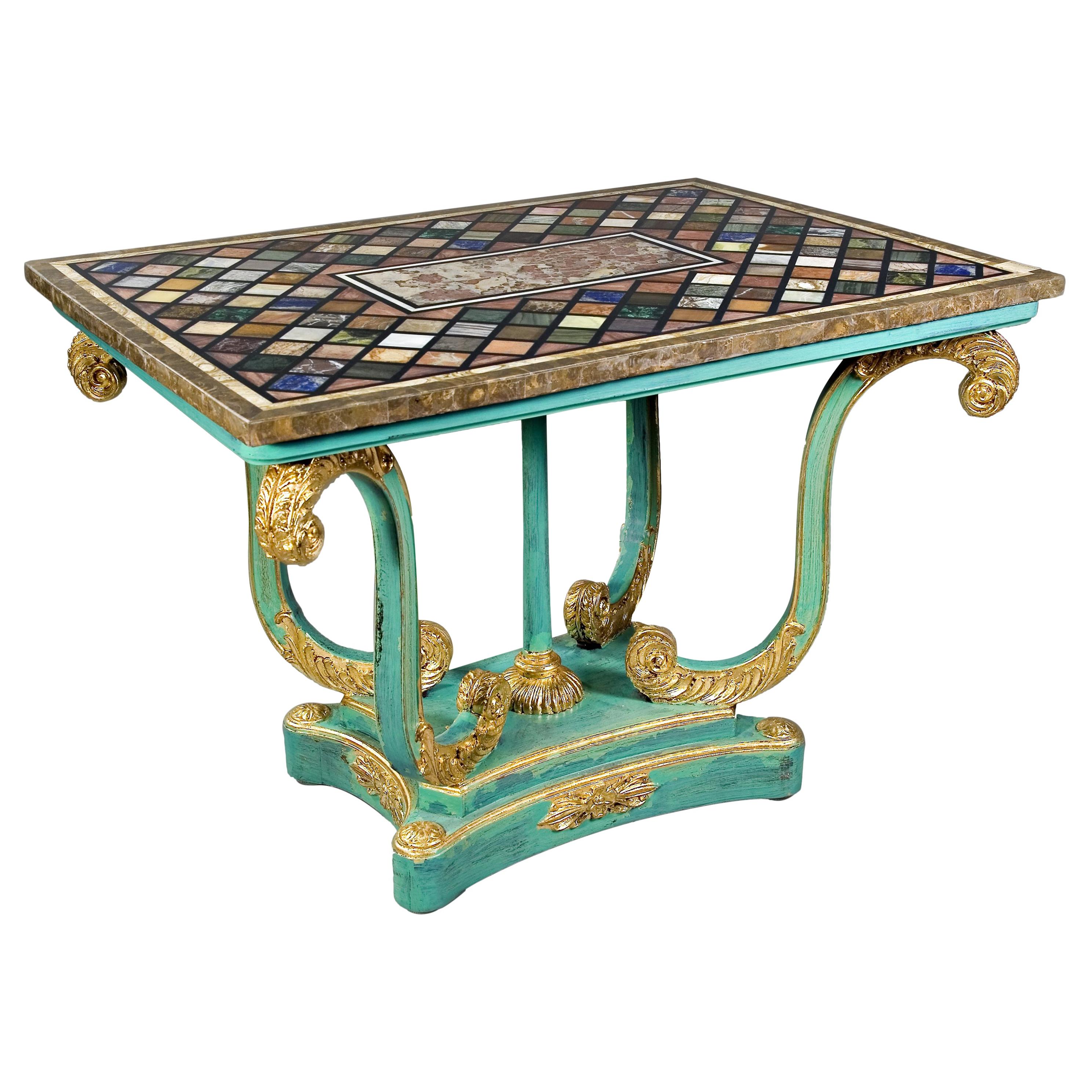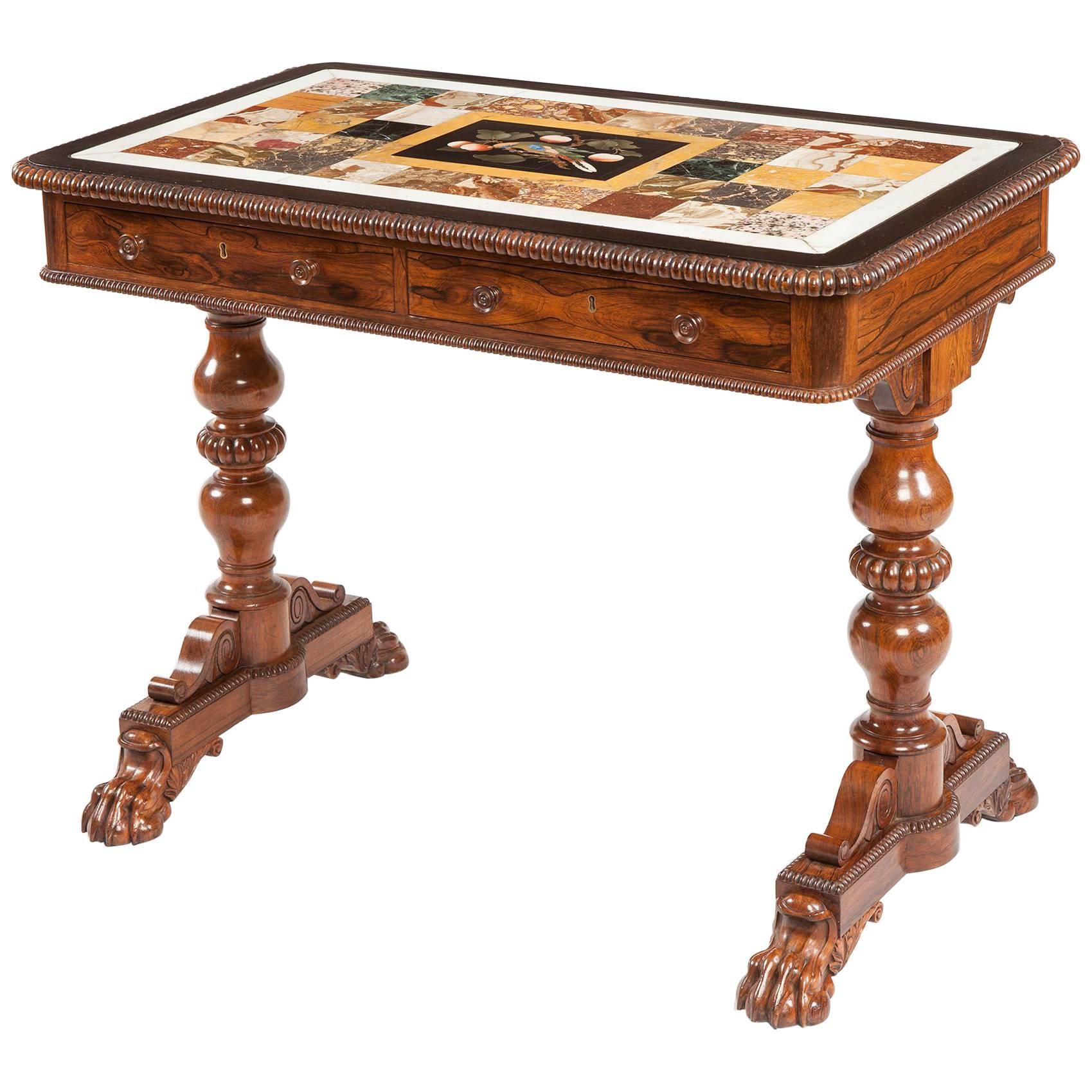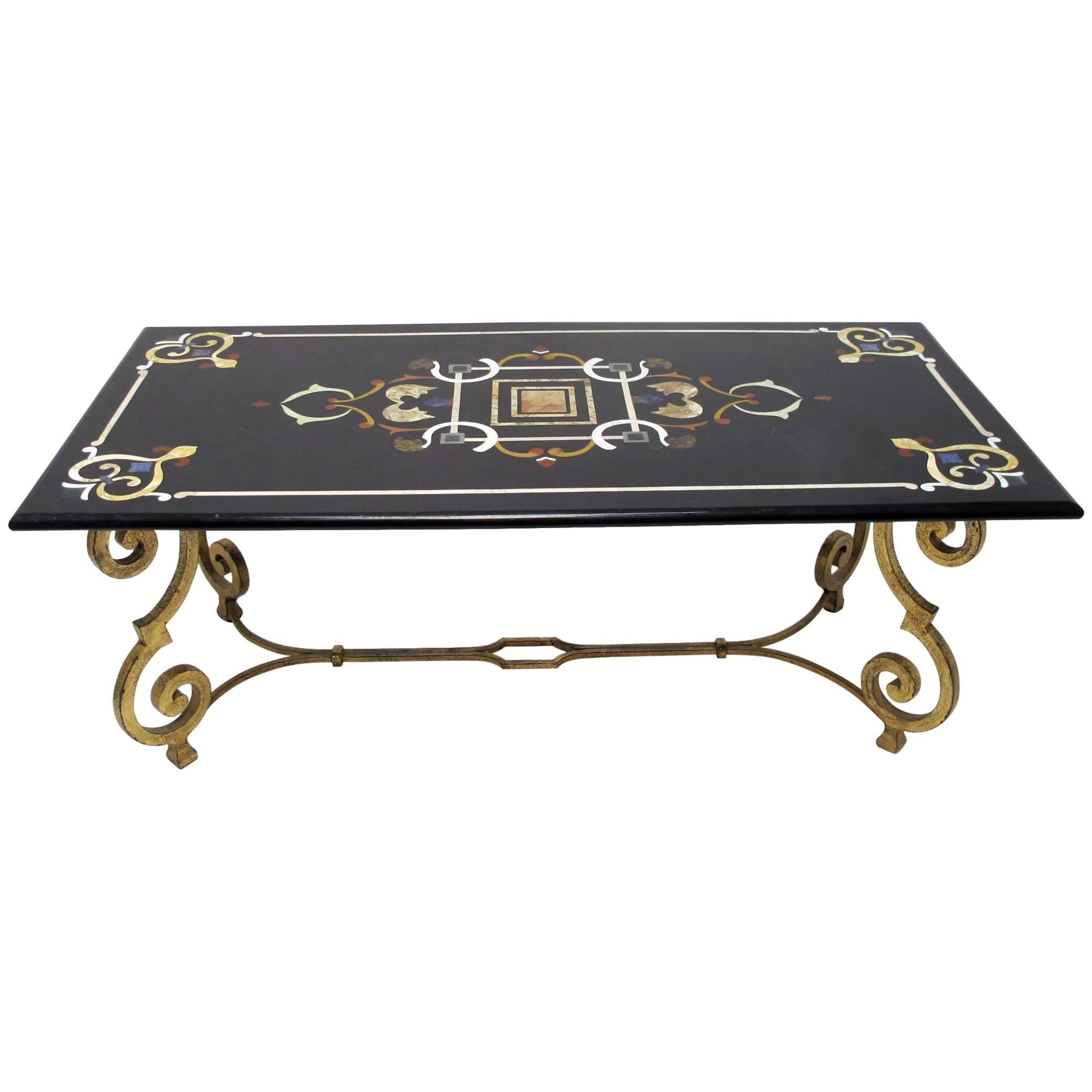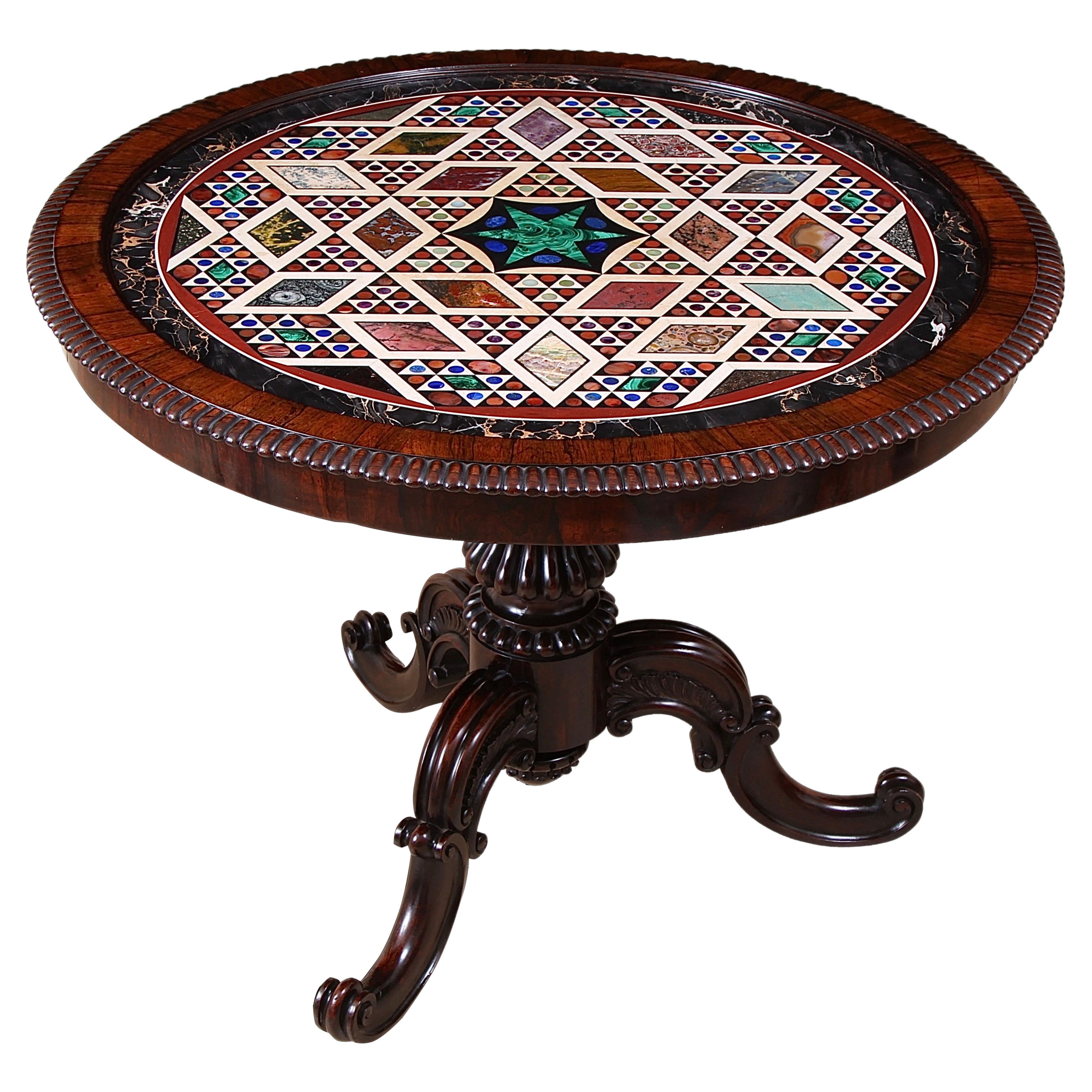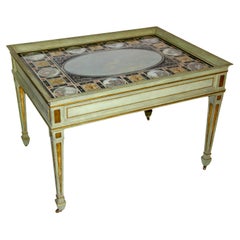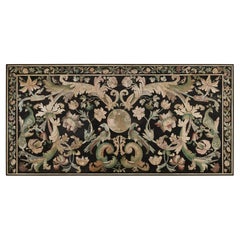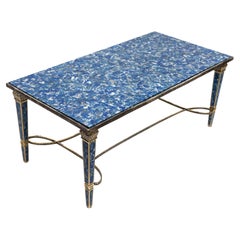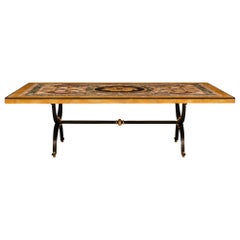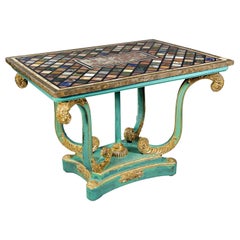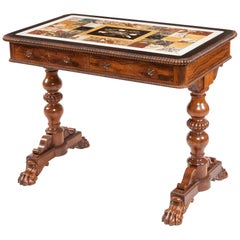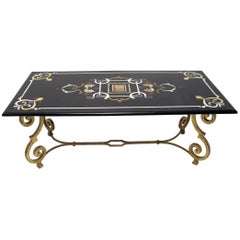Items Similar to 18th Century Italian Pietra Dura Multi-Marble & Specimen Table-Top/Coffee Table
Want more images or videos?
Request additional images or videos from the seller
1 of 17
18th Century Italian Pietra Dura Multi-Marble & Specimen Table-Top/Coffee Table
$92,600
£70,737.28
€81,270
CA$132,398.09
A$145,871.86
CHF 75,512.11
MX$1,756,334.94
NOK 956,165.93
SEK 898,257.41
DKK 606,835.21
About the Item
A Large and Quite Rare 18th Century Italian Pietra Dura Multi-Marble Table-Top/coffee table/low table/center table. The square top is richly inlaid with an extensive array of colored marbles and hardstones, including alabastro fiorito, brocatella di Spagna, breccia corallina, bianco e nero, lapis lazuli, lumachella, giallo antico, rosso antico, and verde antico. The surface is organized around a bold geometric structure, beginning with a central rosette composed of radiating petals in alabastro and other semi-translucent stones, each segment meticulously cut and fitted. This rosette is encircled by a scalloped medallion formed from contrasting marbles, designed with alternating triangular panels of various stones such as verde antico, giallo antico, and rosso antico, set to create a radiating effect. The band is punctuated with oval insets of richly colored stones, producing a rhythmic and structured composition that highlights the inherent qualities of the materials.
Surrounding the central field is a circular trellis-patterned border, alternating diamond-shaped reserves of marble decorated with simple four-petal rosettes set against grounds of brocatella and bianco e nero. This is framed by an additional concentric border of figured marbles, reinforcing the circular structure. The outermost paneling of the top is divided into rectangular reserves, each decorated with scrolling foliage executed in polychrome hardstone against a black ground, incorporating yellows, reds, whites, and touches of blue. These foliate scrolls display tightly curled volutes and fan-shaped leaves, arranged symmetrically to frame each corner and side section. At each corner of the square, quatrefoil devices formed in lapis lazuli, red, and white hardstones create a unifying motif, anchoring the entire design within the square frame. Narrow bands of brocatella marble border each section, dividing the different registers and maintaining the precise geometric order that characterizes the top.
The particular form of the scrolled, entwined leaves within the framing panels and those surrounding the central medallion recalls decorative models from the Grand Ducal workshops in Florence during the late 17th and early 18th centuries, particularly those carried out under the supervision of Giovan Battista Foggini. Their distinctive scalloped shaping, combined with the rich contrasts of colored marbles, points directly to Florentine pietra dura tradition. At the same time, the geometric center with its radiating wedges of specimen marbles is closely aligned with Roman taste for sample compositions of rare marbles arranged into strict geometrical patterns. The synthesis of these two approaches demonstrates the intersection of traditions in Italian workshops, where Florentine scrollwork and Roman geometric ordering coexisted within the same design.
This combination of Roman and Florentine typologies is a notable characteristic of pietra dura production in Naples during the 18th century. Naples, with its long tradition of marble work, was particularly shaped by the manufactory established by Carlos VII of Bourbon, King of Naples and Sicily (1716–1788), who later reigned as Carlos III of Spain. His reign fostered a flourishing of decorative stonework, drawing from both the Florentine Grand Ducal models and the classical preferences of Rome. The Counter-Reformation period in Naples had already established a demand for elaborate marble and hardstone decoration, as churches commissioned altars, balustrades, and furnishings from local marble workers. The expertise acquired in producing ecclesiastical furnishings translated into domestic commissions such as table-tops, where the same techniques of intarsia, polychrome marquetry, and polished hardstone inlay were employed at smaller scale.
The square format of the present table-top is typical of 18th century production, with numerous examples produced for both private residences and ecclesiastical contexts. Many Neapolitan pietra dura table-tops of this type were mounted on marble baluster-shaped supports, as can be seen in comparable surviving examples in Neapolitan churches, such as one preserved at S. Teresa degli Studi, illustrated in A.M. Giusti, Pietre Dure, London, 1992, p.225, fig.82. The survival of the present top with its large dimensions and intact arrangement of both geometric center and elaborate foliate borders situates it within this corpus of important southern Italian pietra dura furnishings.
The selection of materials used for this top underscores its prestige. Lapis lazuli, used sparingly in the corner quatrefoils, signified both costliness and rarity, while ancient stones such as giallo antico and verde antico directly referenced antiquity, much prized during the 18th century for their historic associations. Breccia corallina and alabastro fiorito, with their richly variegated veining, provided additional visual texture. The juxtaposition of translucent alabasters with opaque breccias and ancient Roman stones demonstrates the workshop’s deliberate showcasing of variety, both in color and geological character. This arrangement would have served as a demonstration not only of decorative effect but also of the breadth of material knowledge available to Italian workshops at the time.
This large 18th century Italian pietra dura table-top thus encapsulates the confluence of Roman and Florentine traditions as interpreted in Naples, executed with a mastery of hardstone inlay that required not only technical precision but also a vast access to rare and ancient marbles. Its complex composition, variety of materials, and historical associations with both ecclesiastical and secular commissions mark it as an important survival of Italian decorative stonework, linking the traditions of the Grand Ducal Florentine workshops with the Bourbon patronage of Naples in the 18th century.
Italy, Circa: 1780
- Dimensions:Height: 15 in (38.1 cm)Width: 30 in (76.2 cm)Depth: 30 in (76.2 cm)
- Style:Classical Roman (Of the Period)
- Materials and Techniques:
- Place of Origin:
- Period:1780-1789
- Date of Manufacture:1780
- Condition:Wear consistent with age and use.
- Seller Location:New York, NY
- Reference Number:1stDibs: LU919546165862
About the Seller
4.9
Platinum Seller
Premium sellers with a 4.7+ rating and 24-hour response times
Established in 1820
1stDibs seller since 2011
195 sales on 1stDibs
Typical response time: 1 hour
- ShippingRetrieving quote...Shipping from: New York, NY
- Return Policy
Authenticity Guarantee
In the unlikely event there’s an issue with an item’s authenticity, contact us within 1 year for a full refund. DetailsMoney-Back Guarantee
If your item is not as described, is damaged in transit, or does not arrive, contact us within 7 days for a full refund. Details24-Hour Cancellation
You have a 24-hour grace period in which to reconsider your purchase, with no questions asked.Vetted Professional Sellers
Our world-class sellers must adhere to strict standards for service and quality, maintaining the integrity of our listings.Price-Match Guarantee
If you find that a seller listed the same item for a lower price elsewhere, we’ll match it.Trusted Global Delivery
Our best-in-class carrier network provides specialized shipping options worldwide, including custom delivery.More From This Seller
View AllAn Italian Eglomise Painted Glass Top and painted/Gilt wood Coffee Table
Located in New York, NY
An Italian Eglomise Top Painted and Gilt Coffee Table. A rectangular painted wood coffee table featuring a raised gallery surround and an églomisé-painted Glass top panel. The top i...
Category
Early 20th Century Italian Neoclassical Coffee and Cocktail Tables
Materials
Glass, Mirror, Wood
A Rare 17/18 C. North Italian Scagliola Panel with Parrots, Peacocks, & Flowers
Located in New York, NY
A Very Rare and Incredible 17/18 (1600-1700's) C. North Italian Scagliola Panel with Parrots, Peacocks, Flowers, Vines, and More. A central roundel depicting a kneeling monk present...
Category
Antique 1690s Italian Baroque Tables
Materials
Scagliola
Center Table of a Carved Wooden Roman Figure of a Man with a Pietra Dura Top
Located in New York, NY
A fabulous center table/gueridon with a carved wooden roman figure of a man dressed in Italian 18th century attire with a gorgeous Pietra Dura marble top. Fabulously hand carved, thi...
Category
Antique 1860s Italian Other Center Tables
Materials
Marble
Louis XVI Style Silvered Bronze & Lapis Lazuli Coffee Table, Att. E.F Caldwell
By Edward F. Caldwell & Co.
Located in New York, NY
A Magnificent Louis XVI Style Silvered Bronze and Lapis Lazuli Cocktail/Coffee Table, Attributed to E.F. Caldwell. This striking blue coffee table is made from the finest lapidary h...
Category
Antique Early 1900s American Louis XVI Coffee and Cocktail Tables
Materials
Lapis Lazuli, Bronze
A French Empire Ormolu Mounted Guéridon/Center-table w/ a Green Marble Top
Located in New York, NY
A French Empire Guéridon/Center-table with Egyptian Revival Bronze winged Figural Mounts with a circular Green Verde Antico marble top, supported by a mahogany base with gilded bronz...
Category
Antique 1820s French Empire Center Tables
Materials
Marble, Ormolu
French Louis XVI Style Dore Bronze Mounted Patinated Wood and Glass Center Table
Located in New York, NY
A Gorgeous French Louis XVI style dore bronze mounted patinated wood and glass center table. The wooden legs are beautifully hand-carved and patinated in a dark black patina. The leg...
Category
20th Century French Louis XVI Center Tables
Materials
Bronze
You May Also Like
Italian 18th Century Pietra Dura Marble, Wrought Iron And Brass Coffee Table
Located in West Palm Beach, FL
A most attractive Italian early 18th century Pietra Dura Marble on later wrought Iron and Brass coffee table. The most stunning Pie...
Category
Antique 18th Century Italian Coffee and Cocktail Tables
Materials
Marble, Brass, Wrought Iron
rare Pietra Dura marble Table in antique Neoclassical Style inlay top
Located in Berlin, DE
Solid beechwood, carved and turquoise colored and polished gold-plated. Square frame on S-shaped curved volutes. Centrally a column ending in a rosette-shaped base.
Four-sided base p...
Category
20th Century Italian Neoclassical Revival Tables
Materials
Marble
19th Century Georgian Table with Italian Pietra Dura and Specimen Marble Top
By Gillows of Lancaster & London
Located in London, GB
A late Georgian table in the Gillows manner
Constructed in goncalo alves, having an inset Florentine Pietra Dura platform; of free-standing, turned and tapering end support form, wi...
Category
Antique 19th Century English George IV Tables
Materials
Lapis Lazuli, Marble, Siena Marble
Pietra Dura Marble Top Coffee Table on Gilt Iron Base.
Located in San Francisco, CA
Exquisite coffee or cocktail table with beautiful gilt wrought base and pieta dura (inlaid stone) top, Italy, mid-20th century.
Category
20th Century Italian Coffee and Cocktail Tables
Materials
Stone, Wrought Iron
$3,150 Sale Price
25% Off
Italian Pietra Dura Dining Table
Located in Dallas, TX
Beautiful 19th century Italian dining table, consisting of an inlaid polychrome Pietra Dura tabletop.
Mounted on a later iron base.
Weight approx 1,200 lbs
Category
Antique 19th Century Italian Dining Room Tables
Materials
Stone, Iron
19th Century Italian Specimen Pietra Dura Table Attributed To Giacomo Raffaelli
By Giacomo Raffaelli, Gillows of Lancaster & London
Located in London, by appointment only
One of the most important early nineteenth century specimen hardstone table tops ever created, with 373 specimens, mounted on a beautifully designed and constructed base by Gillow.
...
Category
Antique Early 19th Century Italian Regency Center Tables
Materials
Agate, Amethyst, Carnelian, Lapis Lazuli, Malachite, Belgian Black Marbl...
$52,953 Sale Price
40% Off
